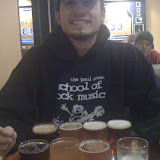COMMUNICATION CLASS IN CULINARY SCHOOL?
What I learned from Professor Burke
By Michael Virtue
After taking the time to soak in the journey I was about to embark upon, I realized a few things. First, I realized that those questions are more ignorant than reasonable. The second thing I realized was that I have been communicating in the restaurant industry for 14 years.
So, how is it then that if I have been communicating within the industry throughout my career has this class helped me? It has been helpful in a number of ways. To start, I have always been an outspoken person, and never felt that I had problems talking to people while working. What I’ve come to find out is that speaking in front of a group of people versus one on one while bartending or serving a table is a lot different. All eyes are on you. People hang on your every word.
Judgments made by the slightest mistake or praises for a job well done are outcomes of your presentation. All these thoughts are ones I found inhabiting my mind as I was asked to make several presentations in my communication class. Here is where I learned the first useful tool from class. Discussions in class about what happens to you when you present in front of groups and what to do to resolve these stage fright symptoms -- rapid heartbeat, shaking or crackling voice; shaking hands or legs? Don’t panic. Just remember to breathe. Slow, deep breaths have a profound effect on nerves. Sounds simple, but it is very effective.
I used this solution every time before speaking, and have used it in other situations not only to calm my nerves, but to help me keep my focus and concentration as well. It’s so simple, yet so effective.
Something else that has shown itself as a useful tool when communicating, not only one-on-one but in groups as well, is speaking with a purpose. I thought about this after we talked about it in class, and I compared it to how I would speak around my friends. If you are passionate about something, the way you present it should not change based on who you are talking to. If I want someone to believe the point I am trying to make, I find myself getting passionate at times. Using expression in my voice, inflection on the right words, making eye contact with the person I am speaking to and speaking clearly and loudly enough are all ways I talk to my friends. So why should that change when you put yourself in front of a group? It should not, but maybe due to nerves or anxiety you look at people less, you miss the words that you want to really nail home or your passion is gone. This is probably what I took from this class the most, that there should be no difference, and that I would always remind myself that I am talking to just one person and not a group.
This made it much easier for me to present to the class on four separate occasions. Pretending that there was only one person in the room, I tried to communicate my point to that one person as I would to a friend. This point was further validated early on in class when we discussed how to speak in front of groups.
Prof. Glenn Burke made a point to note that when he spoke, he made sure that he was making eye contact with each person in his audience, and as he did, he spoke to them as though there was only one person there. Then he would move on to the next set of eyes and speak to them in the same manner. I found myself doing the same thing and it made it so much easier to talk to my classmates.
It also made it easier because going into this class, I was the outcast, the new guy. I had switched from the mid-morning block of classes to the early morning block due to a job opportunity I did not want to eliminate. In making this switch, I was nervous to meet my new classmates. I had already established a rapport with my previous classmates and knew that any speeches I would need to give would have been easier in front of them versus a new group of people.
On the contrary, it worked out in my favor because it made all the points that were discussed in class much more valuable because I had to use them and make them effective in front of people I did not know. Would they even listen to me? Would they care about anything I had to say? These were definitely concerns,
but were put at ease throughout the time in this class because of all the techniques Prof. Burke taught me. From learning to breathe properly, to making eye contact, to using inflection in my delivery to even becoming more comfortable in my own skin in front of people, all these are things I will take with me into the culinary field, in whatever role I take on.
(cont.)
Communication class
in culinary school?
(Continued from page 9)
How is this going to help me going forward and how does it apply to the culinary field? You open your own restaurant, you hire a new staff and the first day of training comes, and you need to address your staff. First impressions are so important, and if you speak well in addressing your new staff, they will respect you more in the future.
Conversely, if you address the staff members, and you fumble over your words, don’t speak clearly or coherently, you not only sound like you don’t know what you are talking about, and your staff will not take you seriously. You’ll have to work that much harder to earn their respect. Or, for instance, if you are working at a restaurant and have to go out into the dining room and address guests for whatever reason, you want to sound professional. Making a point to guests is vital to the success of your restaurant. You impress them, they come back. You fumble and sound uneducated, they talk and tell their friends and now you have a negative reputation. Then you have to work 10 times as hard to gain their loyalty back as your customers.
Communication is the key. Do it well and the result is professionalism and respect. Do it poorly and you look bad, have “egg on your face” and have to work harder to accomplish anything else in the future.
This is what I have learned from this class. Thank you Prof. Burke!



.jpg)
.jpg)














































